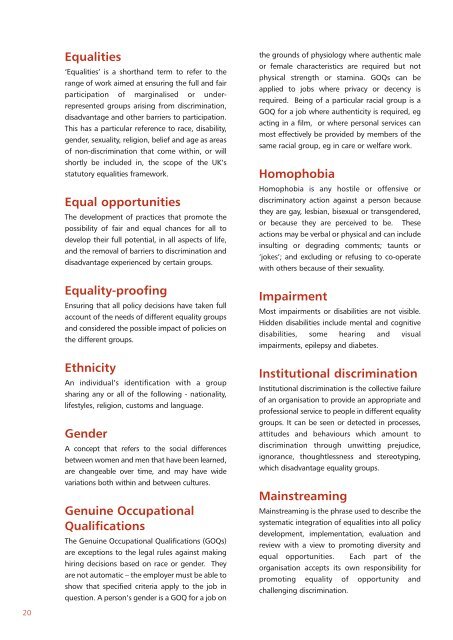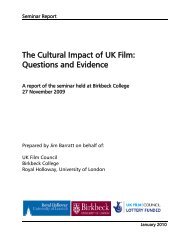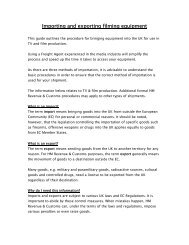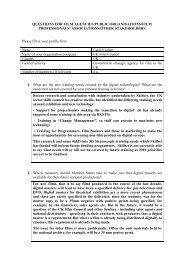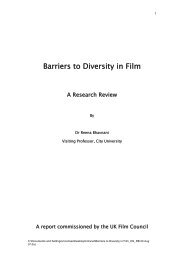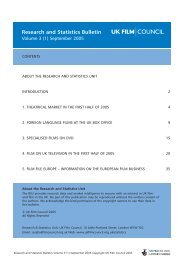Success through diversity and inclusion - BFI - British Film Institute
Success through diversity and inclusion - BFI - British Film Institute
Success through diversity and inclusion - BFI - British Film Institute
You also want an ePaper? Increase the reach of your titles
YUMPU automatically turns print PDFs into web optimized ePapers that Google loves.
20<br />
Equalities<br />
‘Equalities’ is a shorth<strong>and</strong> term to refer to the<br />
range of work aimed at ensuring the full <strong>and</strong> fair<br />
participation of marginalised or underrepresented<br />
groups arising from discrimination,<br />
disadvantage <strong>and</strong> other barriers to participation.<br />
This has a particular reference to race, disability,<br />
gender, sexuality, religion, belief <strong>and</strong> age as areas<br />
of non-discrimination that come within, or will<br />
shortly be included in, the scope of the UK’s<br />
statutory equalities framework.<br />
Equal opportunities<br />
The development of practices that promote the<br />
possibility of fair <strong>and</strong> equal chances for all to<br />
develop their full potential, in all aspects of life,<br />
<strong>and</strong> the removal of barriers to discrimination <strong>and</strong><br />
disadvantage experienced by certain groups.<br />
Equality-proofing<br />
Ensuring that all policy decisions have taken full<br />
account of the needs of different equality groups<br />
<strong>and</strong> considered the possible impact of policies on<br />
the different groups.<br />
Ethnicity<br />
An individual’s identification with a group<br />
sharing any or all of the following - nationality,<br />
lifestyles, religion, customs <strong>and</strong> language.<br />
Gender<br />
A concept that refers to the social differences<br />
between women <strong>and</strong> men that have been learned,<br />
are changeable over time, <strong>and</strong> may have wide<br />
variations both within <strong>and</strong> between cultures.<br />
Genuine Occupational<br />
Qualifications<br />
The Genuine Occupational Qualifications (GOQs)<br />
are exceptions to the legal rules against making<br />
hiring decisions based on race or gender. They<br />
are not automatic – the employer must be able to<br />
show that specified criteria apply to the job in<br />
question. A person’s gender is a GOQ for a job on<br />
the grounds of physiology where authentic male<br />
or female characteristics are required but not<br />
physical strength or stamina. GOQs can be<br />
applied to jobs where privacy or decency is<br />
required. Being of a particular racial group is a<br />
GOQ for a job where authenticity is required, eg<br />
acting in a film, or where personal services can<br />
most effectively be provided by members of the<br />
same racial group, eg in care or welfare work.<br />
Homophobia<br />
Homophobia is any hostile or offensive or<br />
discriminatory action against a person because<br />
they are gay, lesbian, bisexual or transgendered,<br />
or because they are perceived to be. These<br />
actions may be verbal or physical <strong>and</strong> can include<br />
insulting or degrading comments; taunts or<br />
‘jokes’; <strong>and</strong> excluding or refusing to co-operate<br />
with others because of their sexuality.<br />
Impairment<br />
Most impairments or disabilities are not visible.<br />
Hidden disabilities include mental <strong>and</strong> cognitive<br />
disabilities, some hearing <strong>and</strong> visual<br />
impairments, epilepsy <strong>and</strong> diabetes.<br />
Institutional discrimination<br />
Institutional discrimination is the collective failure<br />
of an organisation to provide an appropriate <strong>and</strong><br />
professional service to people in different equality<br />
groups. It can be seen or detected in processes,<br />
attitudes <strong>and</strong> behaviours which amount to<br />
discrimination <strong>through</strong> unwitting prejudice,<br />
ignorance, thoughtlessness <strong>and</strong> stereotyping,<br />
which disadvantage equality groups.<br />
Mainstreaming<br />
Mainstreaming is the phrase used to describe the<br />
systematic integration of equalities into all policy<br />
development, implementation, evaluation <strong>and</strong><br />
review with a view to promoting <strong>diversity</strong> <strong>and</strong><br />
equal opportunities. Each part of the<br />
organisation accepts its own responsibility for<br />
promoting equality of opportunity <strong>and</strong><br />
challenging discrimination.


